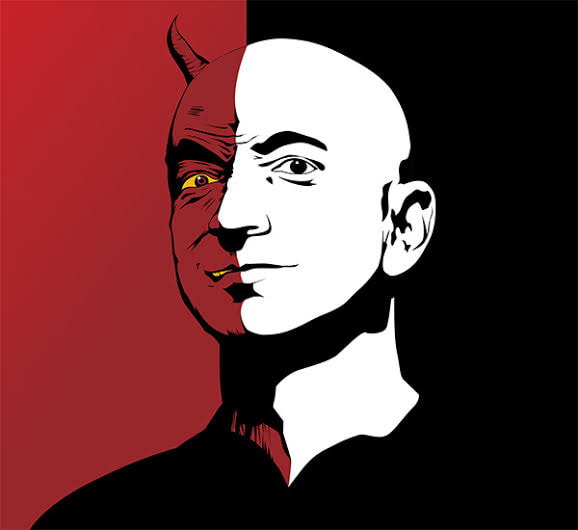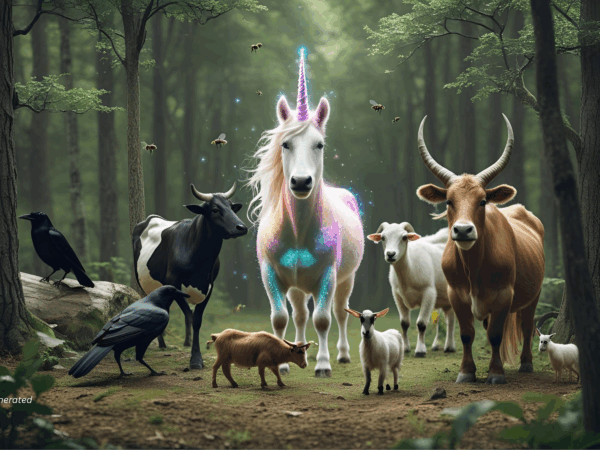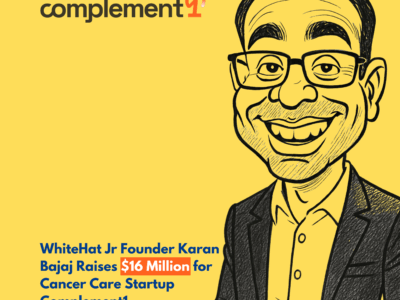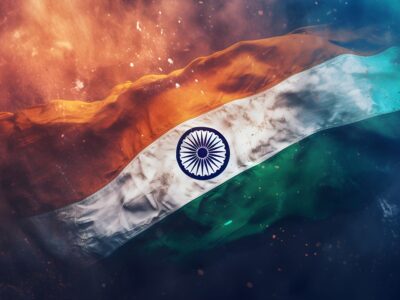
Image: https://www.hearthandhome.com/magazine/2018-10-15/amazon:_a_necessary_evil_.html
I have been working with Amazon as a seller for 4 years now, and as a customer for slightly longer. However, the more I understand their systems and processes and the closer I look, the more harmful they seem to literally every party concerned. Indeed, the more powerful and larger they get, the more I fear that they will end up hurting the interests of the consumers, the manufacturers, the traders, the retailers, the communities, the government, as well as their employees, vendors and suppliers, and the environment. The only stakeholders they will end up pleasing would be their investors. I have wondered how we got to this stage where they are bigger and more powerful than many small nations. Who or what will stop them before they destroy everything we hold dear? Apart, of course, from hubris. Would love to talk of this in person over a beer when any one of you visit Pune or if you are already in Pune. Do ping me. It’d be a pleasure.
My bet is that only governments can stop the tech giants like Amazon, Alphabet, and Meta. Capitalism has failed to produce the competition that in theory should not have allowed these brands and companies to grow to this extent in the first place. In fact, the ‘competition’ itself is aping them, whether it is Jio or Alibaba or Tata. There is no hope to be had from others who are simply the same except for the logo.
The problem with these giants are their various terms & conditions, community standards and degrees of freedoms allowed, leeways and trust thresholds their algorithms set for everything and everyone, and indeed what can only be defined as the moral standards of the platform as decided by the nameless, faceless, addressless entities that have created these stipulations that are clearly designed to extract the maximum amount of money from you, coupled with the unevenness, indeed unfairness, of their appeals process.
Apparently, these adhere to their own, self-defined moral code and the processes derived from it, and not necessarily to the law of the land. Shouldn’t this be easily correctible? Of course, all one has to do is to go to the local court with the offending piece of term or condition and get the court to direct the commercial entity to amend its rules to come in line with the local rules & regulations.
However, while that sounds great in theory, here are some obvious practical problems:
1. Delta of difference: The commercial entity’s terms differ so very slightly from the local laws and customs that most affected parties let it go. After all, who would go to court to recover an unfair debit of, say Rs.299 once in a while when one is making Rs.10 lakh per month from the same portal? But the Rs.299 in this example from say, a million vendors per month, or per week, soon adds up.
2. Legal firepower: If one does find the time, energy, bandwidth, and resources to indeed go to court over the abovementioned Rs.299, the forces arrayed against you, indeed the legal firepower the tech giant can bring to the table, even for the smallest grievance, is so formidable as to reduce your odds of even getting to a hearing next to nothing, leave alone getting a sympathetic verdict in the favour of the prosecution.
3. Market ownership: Even if one were to win the hypothetical case for Rs.299 in the lower court, and even if one were to win it all the way to the Supreme Court, where the tech giants will no doubt take it, you have now lost the use of their service since you are not blacklisted, something well within their rights as a privately run business. You cannot force them to list or sell your goods. So, you are doubly the loser now.
4. PR muscle: Their marketing and public relations departments are so well-funded and well-oiled that even if you win every case against them, you will come out looking like a villain Indeed, you will have reverse cases against you by their formidable legal team and will spend the rest of your life and your earnings fighting them or on the run or in jail.
5. Too big: At the end of the day, in the highly unlikely scenario of the tech giants really losing every case, in the legal courts, media courts, and the courts of public opinion too, they can simply threaten to pull out, and carry out their threat in the worst case. The revenue and employment, the contribution to the economy and the workforce, their philanthropy and political donations, are so large a factor in the lifeblood of a society that most countries and governments will buckle under the pressure.
In short, there is nothing a small vendor can do. What about larger vendors then? Why does not an HUL or an ITC take on the might of a, say Amazon or Jio? Well, they don’t want to. They are in cahoots. This is literally why we have anti-competition laws and used to have an MRTPC (Monopolies and Restrictive Trade Practices Commission), which is now the CCI (Competition Commission of India) with a much watered-down mandate and a defanged and toothless entity. The formation of cartels is banned. Price-fixing is banned, collusion is banned, but it carries on. And you don’t need me to tell you this. Everyone knows that the big giants are all hand-in-glove except when it comes to optics. Inke khaane ke daant aur hain, aur dikhaane ke aur.
Long ago (13 January 2010), I wrote a rambling, long-winded, (and needlessly loquacious) article on whether big corporations (specifically those that control trust, like say Visa or MasterCard) will go head-to-head with governments and what might happen in such a scenario. Do let me know what you feel. Note that this was thought of in the late 1990s and early 2000s, but written only in 2010. So, it is indeed quite dated. Also, my presumption that it would be Visa and MasterCard who would become too big to control has been proven wrong, and it has not escaped me that companies such as Amazon, Alphabet, and Meta were not even a twinkle in their founders’ eyes when I envisaged this in the late 1990s.
Be that as it may, the sentiment does not change. Nor does the question: Are there technology companies that control so much of the financial transactions in a given market that they may supplant the government one day? Or is there something that will cause their downfall, as history has shown numerous times in the past? Or are we seeing the rise of a meme to replace nationalism, just as nationalism rose to replace religion, though none of them have done a good job of it.
Till then, let us hope that the Greeks were right and at the end of the day, hubris takes down even the most powerful without the oppressed and powerless having to do anything. Amen to that.
Later edit: Some people tell me that as long as it is benefitting the consumers, we should not have a problem. Capitalism has always worked that way, I am told, and if the final result of any action is better products or services for consumers, even if it comes at the cost of the sellers, what the hell is wrong with that? As a committed capitalist myself, I have news for them. Do they know who these ‘sellers’ are? They are not a different species than the consumers. Each consumer is connected to some seller, either by working for them or with them or being a seller themselves. An economy purely of consumers is a dead economy. Amazon is fooling us all into thinking that since it looks, prima facie, that consumers are being benefitted at the cost of the manufacturers, distributors, dealers, retailers, shopkeepers, logistics providers, labellers, packers, salespeople, delivery boys, and the whole chain in the ecosystem, we should think (and thank) them to be some sort of saviours. That is a fallacy they want us to believe. YOU ARE NOT JUST A CONSUMER. Your ‘consumership’ (if there is such a word) derives itself from your ability to contribute to production first. Amazon is killing producers. You are a producer first. Remember that before you hail Amazon, and its ilk, as the first saints of Capitalism. True capitalism requires competition, seamlessness and equality in information flow and access to it, a level playing field, consensual and consumer-friendly regulations, and access to credit and finance to all deserving parties. It requires a stable democratic system in place where the powers-that-be act without fear or favour, because their elections are not tied to the money or tech muscle provided by the very commercial entities they are expected to regulate in favour of their constituents. It requires a free & fair media and an unbiased (and quick) judiciary. What you see in India, and most of the world today, is oligarchy, not capitalism. Not by a long shot.



















